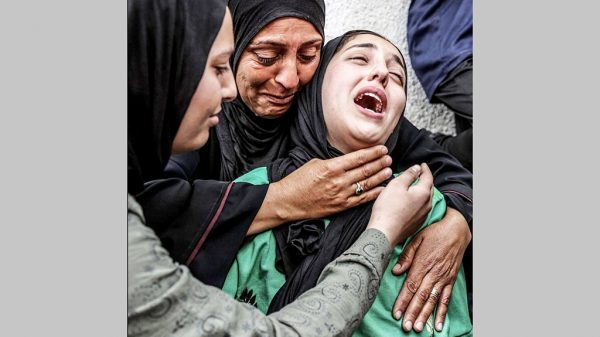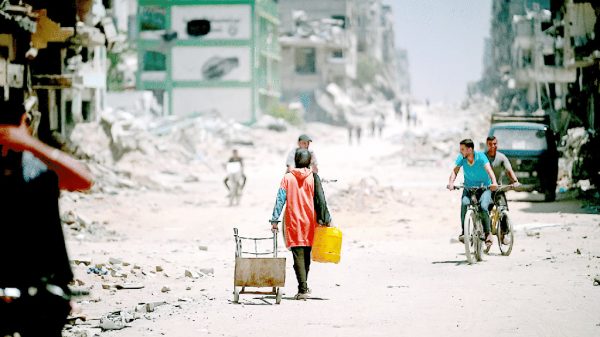Work on All Fronts to Tackle Pandemic

Dr Tarek Hussain:
In these unprecedented times, we are witnessing and becoming a part of a historic war wage. WHO declared that the coronavirus is now humanity’s greatest threat. Tony Blair described the outbreak as a “very tough crisis” that will damage countries’ health care systems economies.
Government of Bangladesh had begun taking preventive measures and preparing to fight against it on a war footing. Disease surveillance, laboratory monitoring, treatment guidelines, training guidelines and awareness campaigns are being strengthened.
The risk of widespread sustained transmission of the coronavirus in many parts of the World including Bangladesh, in the coming weeks is moderate to high, with more countries expected to report more cases and clusters. The predication is based is on a number of factors, such as the increasing number of countries with widespread community transmission around the world. These are exporting cases with subsequent transmission to previously unaffected areas. The control measures have up to now been able to only slow, but not stop further spread.
Cases with mild symptoms are numerous and able to transmit the infection. These cases are not always aware of their potential infectivity, and some people with mild symptoms have sought medical care, thereby infecting health care workers.
Following the Prime Minister’s address to the nation on the evening of March 25, the Government of Bangladesh’s strategy for dealing with a potential stage of community transmission of the COVID-19 epidemic is now evident, a national lockdown (seems) from 26th March to 4th April is in action. They are hoping to break the transition using a full national restricted mobility, curtailing mobility on a scale where even the Government is to shut down, except for a key few sectors.
The 10-day general holiday should be extended further, at least another 4 days to make it 14 days, since 14 days is often cited as a safer margin for quarantine, but 28 days is safest margin.
The following are some of the immediate issues that need to be addressed in the lock-down:
► Mobility to be completely restricted -must be ensured.
► Particular attention must be paid to the pro tection of front line workers in the medical, public health and sanitation sectors and others on the frontlines of the anti-COVID- 19 effort.
► The relevant government departments also need to work with at least a mini mal func tionality at all levels.
► Food and Civil Supplies must be functional and not shut down.
► Government must ensure that the financial resources required for the adequate protec tion of those involved in essential services, and the supply of essential commodities, is made available.
► The identification of positive cases, their quarantine and care, if they turn sympto matic, as necessary, including intensive care, needs to be ensured. This cannot be done without a functioning Health depart ment; and
► The Guidelines should be in place to indi cate clearly how the bulk of the population is to manage during the 10 day shut-down, and the necessary financial, administrative and logistical and material arrangements to ensure the population basic minimum well- being.
The Ministry of Home Affairs needs to clarify that these strict restrictions fundamentally relate to the movement of people but not to that of essential goods and services. The government should reiterate that transportation for all essential service personnel will be permitted. The government needs to assure county health and human services agencies are equipped to care for the county’s most vulnerable citizens. These agencies should analysis how the potential spread of the virus could impact food banks and increase the need for other social services, WHO Chief, Mr. Tedros urged every country to take six steps right now:
The steps are:
Increase the number of health workers, provide training and work; Determine strategies to identify suspected victims;
Extend and facilitate the production of test kits Finding infrastructure that can be prepared to treat coronavirus victims; Determine plans to quarantine suspects; Take steps to prevent the spread of the virus.
There’s been a “lockdown” approach to the global coronavirus outbreak. Cooperation and coordination are “needed most to solve this problem in the quickest possible way,” While social assistance packages are important, they won’t be as effective as they can be “unless people have confidence that the authority, that their leader (Hon’ble PM in case of Bangladesh) is in control,”
BUT:
► What is really absent is that sort of coordi nation
We all know that there are many, many different actions that are needed to address the coronavirus. We have a situation that is very complex and it requires on the one side, very swift action and on the other side, a strong coordination at all the levels and all the different sectors – not only on the national level but of course on the sub-national level.
The Health Ministry should spearhead a wide range of initiatives across the country to tackle the novel coronavirus. Any fragmented and weak and incompetent staff structure within the Health Ministry will worsen the situation. Effective Leadership is core to lead the proce ss.
Ensuring awareness across all sections of the society and using all the possible machineries, we will overcome this crisis and learn a lot from the experience. Take these learning have and build on them. Most importantly right now, make sure you and your family are safe.
The writer is a former UN International Staff (ICS) who has hands-on experience of dealing with Avian Influenza in Indonesia and Ebola in Africa.




























Leave a Reply